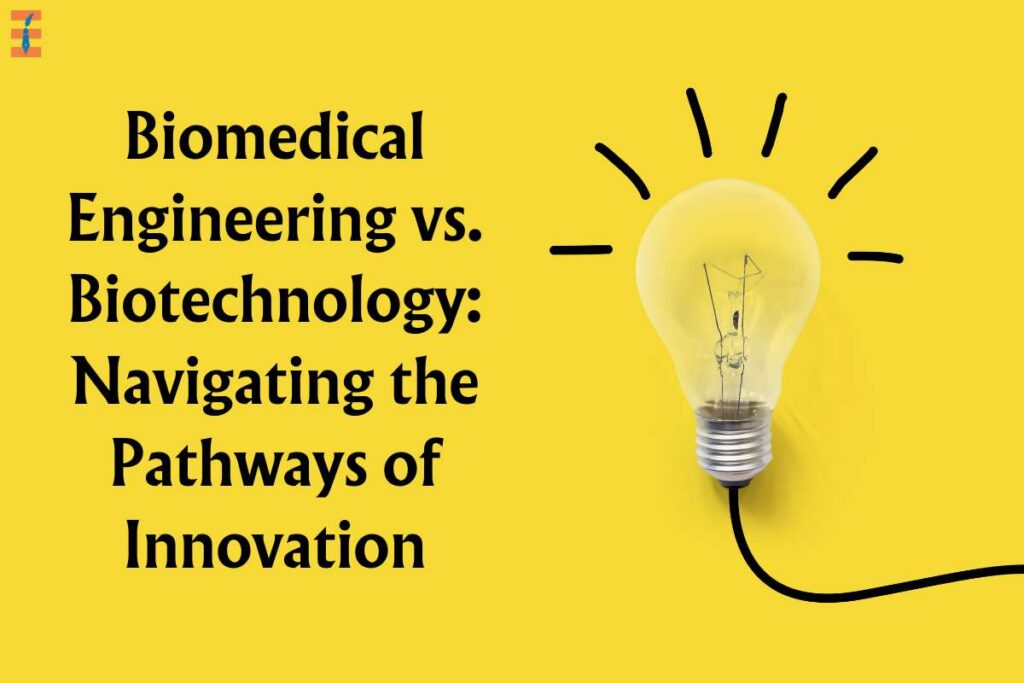Since the pandemic, the world has needed more doctors, physicists, pharmacists, and medical practitioners. Therefore, it is important to get more human resources from this field. There could be confusion about choosing biotechnology and bioengineering. Though these fields have emerged as the cornerstone of modern healthcare and research, both of them have emerged as the perfect disciplines that can transform the way research and practices are going today. They can bring evolution to the human disease ionization power and discover new vaccines to cure it.
Here are 8 differences between biotechnology and bioengineering:
Biotechnology and bioengineering have emerged as transformative fields that have revolutionized industries ranging from healthcare and agriculture to environmental conservation and energy production. These disciplines harness the power of biological systems and engineering principles to create innovative solutions that address some of the most pressing challenges facing humanity. Their importance lies not only in their ability to advance scientific knowledge but also in their potential to reshape industries, improve quality of life, and sustain our planet for future generations.
1. Advancing Medicine and Healthcare

Biotechnology has fundamentally changed the landscape of medicine and healthcare. The development of biopharmaceuticals, gene therapies, and personalized medicine has revolutionized disease treatment and prevention. Biotechnological breakthroughs have enabled the creation of targeted therapies that address the underlying causes of diseases, resulting in more effective and less invasive treatments. Furthermore, advancements in diagnostic techniques and medical imaging owe a great deal to the convergence of engineering and biological sciences.
2. Feeding the World
As the global population continues to grow, ensuring food security becomes a paramount concern. Biotechnology plays a crucial role in enhancing crop yields, improving plant resistance to pests and diseases, and developing drought-resistant varieties. Genetic modification of crops has the potential to produce more nutritious foods that can address malnutrition in various parts of the world. Additionally, biotechnology aids in the development of sustainable agricultural practices that minimize environmental impact.
3. Environmental Sustainability

Biotechnology offers innovative approaches to addressing environmental challenges. It plays a pivotal role in bioremediation, where living organisms are used to clean up polluted environments. Microorganisms can be engineered to break down harmful pollutants, contributing to the restoration of ecosystems. Moreover, biotechnological processes are employed in the production of biofuels, reducing reliance on fossil fuels and mitigating the impacts of climate change.
4. Renewable Energy
Bioengineering contributes to the development of renewable energy sources. Microorganisms can be engineered to produce biofuels such as ethanol and biodiesel, offering a more sustainable alternative to conventional fossil fuels. Additionally, bioengineering techniques are used to improve the efficiency of bioenergy production from sources like agricultural waste and algae.
5. Industrial Applications
Biotechnology has revolutionized industrial processes by providing efficient and sustainable alternatives. Enzymes and microorganisms are employed to produce chemicals, materials, and products in eco-friendly ways. This reduces the reliance on traditional manufacturing processes that often generate harmful byproducts and pollutants.
6. Personalized and Regenerative Medicine
The synergy of biotechnology and bioengineering has enabled the development of personalized medicine and regenerative therapies. Stem cell research and tissue engineering offer the potential to create replacement organs and tissues, revolutionizing transplantation medicine. Personalized medicine tailors treatments based on an individual’s genetic makeup, leading to more effective and safer interventions.
7. Research and Discovery
Both biotechnology and bioengineering fields drive scientific exploration and discovery. Biotechnological tools such as genetic sequencing, gene editing, and bioinformatics have accelerated our understanding of biological processes. Bioengineering contributes to the creation of sophisticated research tools, enabling scientists to delve deeper into the mechanisms of life.
8. Economic Growth and Job Opportunities
The growth of the biotechnology and bioengineering sectors has not only spurred innovation but also created a significant number of job opportunities. Skilled professionals in these fields are in high demand across academia, industry, and research institutions, contributing to economic growth and prosperity.
Biomedical engineering: the fusion of engineering and medicine
Biomedical Engineering (BME) stands at the intersection of engineering, biology, and medicine, weaving together principles from these domains to create innovative solutions for medical challenges. This field focuses on designing and developing medical devices, equipment, and technologies that enhance patient care, diagnose illnesses, and improve quality of life. From artificial organs and prosthetics to medical imaging systems and wearable health devices, the work of biomedical engineers has revolutionized the healthcare landscape.

One of the key strengths of biomedical engineering lies in its interdisciplinary nature. Engineers in this field collaborate closely with medical professionals to understand clinical needs and translate them into tangible solutions. By harnessing principles from mechanical engineering, electronics, materials science, and computer science, biomedical engineers create tools that are not only effective but also safe and reliable.
However, the multidisciplinary nature of biomedical engineering can also present challenges. Balancing technical expertise with medical knowledge requires a significant investment in learning and collaboration. Moreover, regulatory and ethical considerations are paramount, as any device or technology developed must adhere to strict safety and efficacy standards.
Biotechnology: unleashing the power of biological systems
Biotechnology, on the other hand, is centered on harnessing the power of living organisms, cells, and biological systems to create products and processes that benefit society. This field encompasses a wide range of applications, from pharmaceuticals and therapeutics to agricultural advancements and environmental solutions. Biotechnologists manipulate the genetic and biochemical makeup of organisms to develop new treatments, vaccines, and sustainable solutions to global challenges.
One of the major strengths of biotechnology is its potential for groundbreaking discoveries. Genetic engineering, gene therapy, and biopharmaceutical production have transformed medicine, enabling the development of targeted therapies and personalized treatments. Additionally, biotechnology can address global issues such as food security and environmental sustainability by improving crop yields, developing biofuels, and cleaning up pollutants.
However, biotechnology is not without its ethical and regulatory concerns. Manipulating genetic material raises questions about the potential consequences of altering natural systems. Striking a balance between innovation and potential risks is a constant challenge in the biotechnology field.
Choosing the path: Factors to consider
Deciding between biotechnology and bioengineering depends on personal interests, skills, and career aspirations. Here are some factors to consider:
Passion and Interest
Are you more intrigued by medical devices and healthcare technologies (BME) or by the manipulation of biological systems (Biotechnology)?
Skill Set
Do you have a stronger background in engineering and technology (BME) or biological sciences (Biotechnology)?
Career Goals
Are you interested in designing medical equipment, prosthetics, and healthcare systems (BME) or in developing novel treatments, vaccines, and bio-products (Biotechnology)?
Interdisciplinary vs. Specialized
Do you prefer working across disciplines (BME) or focusing deeply on biological processes (Biotechnology)?
Ethical and Regulatory Considerations
Are you comfortable navigating the ethical challenges associated with human health technologies (BME) or the ethical concerns related to genetic manipulation (Biotechnology)?
Conclusion
It is a difficult choice to make which is the best: biotechnology and bioengineering. Both of them are indispensable in the field of modern science and technology. They are contributing to the well-being and welfare of humankind. Pursuing them as a career option may leverage revolutionary solutions with important insights in the medical field. You should prioritize your interests, skills, and aspirations over any other thing in your career. After studying the pros and cons of biotechnology and bioengineering, you can choose the most appropriate career field: biotechnology or bioengineering.

